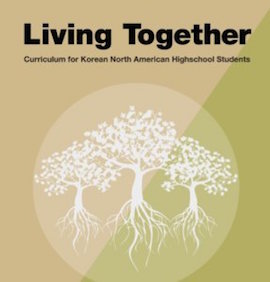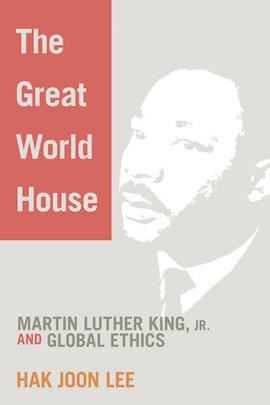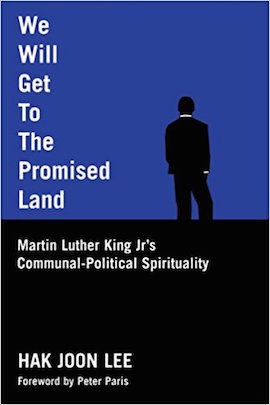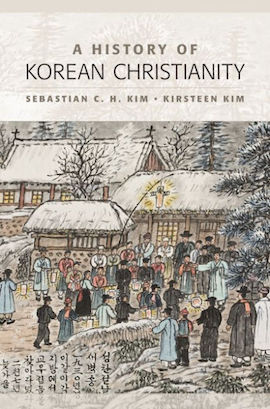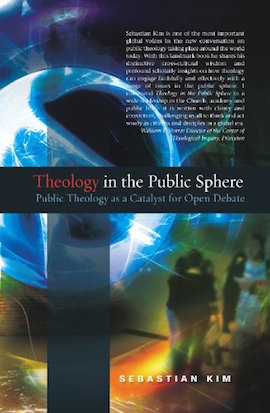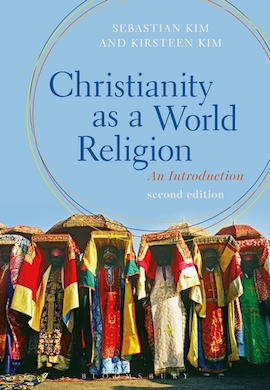Hak Joon Lee
LEWIS B. SMEDES PROFESSOR OF CHRISTIAN ETHICS
MDIV, PRINCETON THEOLOGICAL SEMINARY
PHD, PRINCETON THEOLOGICAL SEMINARY (SUMMA CUM LAUDE)
COURSES TAUGHT
ET501: Christian Ethics
ET528: Creation Care and Sabbath Economics
ET543: The Theology and Ethics of Martin Luther King Jr.
ET844/544: Covenant and Christian Ethics
ET846/546: God and Globalization
ET859/559: Methods in Christian Ethics
CAMPUS AFFILIATIONS
AREAS OF EXPERTISE
Christian ethics, Martin Luther King Jr., public theology, Reformed theological ethics, globalization, Asian American theology and ethics, Trinity, and covenant
“I see certain glimpses of koinonia relationships among the students who take my Martin Luther King Jr. course and other classes. My classroom at Fuller is that laboratory of building God’s beloved community—the triune God’s beloved community—in a wonderful, covenantal relationship of mutual respect, and no domination. That’s my Fuller classroom.”
Dr. Lee, in an essay on the ways forgiveness and justice contribute to reconciliation available here.
BIO
Hak Joon Lee was named Lewis B. Smedes Professor of Christian Ethics in September 2015, having served on the Fuller faculty since 2011 as professor of theology and ethics. He is an ordained Minister of Word and Sacrament in the Presbyterian Church (USA).
Dr. Lee’s research focuses on covenant, public theology, global ethics, and Asian American theology and ethics. He has also centered much of his attention on the ethics and spirituality of Martin Luther King Jr., and has been invited to be the keynote speaker for Martin Luther King Jr. Day celebrations in several cities. With Dr. King as his spiritual model, Lee has been active in the advocacy for racial justice and reconciliation in various institutional contexts. He frequently serves as a consultant and a mentor on these topics for local churches and individuals
Lee has published several books in English, including : God and Community Organizing: A Covenantal Approach (Baylor, 2020), Doing Justice: Decisive and Diverse Responses (coedited, IVP, 2019), Intersecting Realities: Race, Identity, and Culture in the Spiritual-Moral Life of Young Asians (Cascade, 2018), Shaping Public Theology: Selections from the Writings of Max L. Stackhouse (coedited, Eerdmans, 2014), The Great World House: Martin Luther King Jr. and Global Ethics (Pilgrim Press, 2011), We Will Get to the Promised Land: Martin Luther King Jr.’s Communal-Political Spirituality (Pilgrim Press, 2006), Covenant and Communication: A Christian Moral Conversation with Jürgen Habermas (University Press of America, 2006).
Lee’s book Christian Ethics: A New Covenant Model an innovative methodology of Christian ethics based on the New Covenant of Jesus, is forthcoming in November 2021 (Eerdmans).
Lee has also written numerous articles and two books in Korean: Bridge Builders (Doorae Media, 2007) and the award-winning A Paradigm Shift in Korean Churches (Holy WavePlus Press, 2011).
With more than seventeen years of experience in pastoral ministry, Lee’s passion has been the renewal of the church in the globalizing, digitized world through the deeper integration of ecclesia and academia. He has led several curriculum writing projects that are theologically grounded and culturally relevant. For example, Lee was coeditor of the Micah 2 project (funded by Fuller’s Ogilvie Institute for Preaching), an ethics curriculum which about a thousand pastors in ten different countries are using; additionally, in 2016, he and a group of Fuller students published the Wilderness Manifesto in response to the interlocking crises that humanity experiences today (economic inequality, ecological degradation, educational deficiency); and in 2007, Lee founded G2G Christian Education Center, a research institute on Asian American Christianity and culture. Through the center, he has published several contextually grounded curricula for Korean North American youth and their parents.
Lee enjoys extracurricular interactions with Fuller students, especially sharing table fellowship and hikes in the San Gabriel Mountains.
Find Hak Joon Lee on FULLER studio
Sebastian C. H. Kim
ACADEMIC DEAN FOR THE KOREAN STUDIES CENTER AND ROBERT WILEY PROFESSOR OF RENEWAL IN PUBLIC LIFE
BSC, HANYANG UNIVERSITY
MDIV, PRESBYTERIAN UNIVERSITY AND THEOLOGICAL SEMINARY
THM, FULLER THEOLOGICAL SEMINARY
PHD, UNIVERSITY OF CAMBRIDGE
COURSES TAUGHT
ET552: Theology in the Public Sphere
MK759: Mission, Ethics, and Public Theology
CAMPUS AFFILIATIONS
AREAS OF EXPERTISE
Public theology, Korean Christianity, world Christianity, Asian theologies, theology and peacebuilding, theology and society
VIDEOS
“I am bringing together a vibrant team at Fuller for research and teaching, to help the Korean Studies Center nurture leaders for Korean churches and mission organizations, facilitate in-depth research on theology and mission, and encourage the interaction of Korean churches in global contexts.”
Dr. Kim, reflecting on the future of the Korean Studies Center. Read more.
BIO
Sebastian Chang Hwan Kim joined the Fuller Seminary faculty in 2017, coming from York St John University in the UK, where he held the chair in Theology and Public Life in the School of Humanities, Religion, and Philosophy for 12 years. He also served as a university head of research and director of the Centre for Religion in Society. Prior to joining York St John University, he was director of the Christianity in Asia project and taught world Christianity in the Faculty of Divinity at the University of Cambridge. He also taught at Union Biblical Seminary in India, and served as interim director of the Henry Martyn Centre and Henry Martyn Lecturer at the Cambridge Theological Federation.
Dr. Kim’s scholarship interests include public theology, world Christianity, Asian theologies, and theology and peace building. He has authored four books: A History of Korean Christianity (Cambridge University Press, 2015), Theology in the Public Sphere: Public Theology as a Catalyst for Open Debate (2011), In Search of Identity: Debates on Religious Conversion in India (Oxford University Press, 2005), and Christianity as a World Religion (2nd ed., Bloomsbury, 2016). Books he has edited include A Companion to Public Theology (Brill, 2017), Cosmopolitanism, Religion, and the Public Sphere (Routledge, 2014); Building Communities of Reconciliation: Reflections on the Life and Teaching of Reverend Kyung-Chik Han (Nanumsa, 2012); and Christian Theology in Asia (Cambridge University Press, 2008). Kim is a fellow of the Royal Asiatic Society, an executive committee member of the Global Network for Public Theology, a member of the Society for the Study of Theology, and former editor of the International Journal of Public Theology.
Two of Kim’s monographs (A History of Korean Christianity and Christianity as a World Religion) were coauthored with his wife, Kirsteen Kim, Paul E. Pierson Chair of World Christianity in Fuller’s School of Mission and Theology. They are the proud parents of two grown children.
Dr. Kim’s CV and a list of current publications can be found here.
Dr. Kim offered these comments on the escalating military tension on the Korean peninsula in early 2017.
Find Sebast FULLEian Kim onR studio
G. Sujin Pak
Dean of the School of Theology, Professor of the History of ChristianityTITLEDean of the School of Theology, Professor of the History of Christianity
OFFICE110
EMAILgspak@bu.edu
PHONE617-353-3052
EDUCATION2006, PhD, Duke University, Graduate Program in Religion
1997, MTS, Duke University Divinity School
1993, BA, Emory University, Religion and Psychology
Dr. G. Sujin Pak is an expert in the history of Christianity with a focus on the early modern period, the Protestant Reformation, and the history of biblical interpretation. She has taught courses on the history of Christianity, the Protestant reformers, the history of biblical interpretation, and medieval female mystics. Through her several major publications, lectures, and invited presentations, she has made a significant impact on her field. As a teacher, Dr. Pak encourages her students to master not only a variety of perspectives, but also the social contexts whence those perspectives emerged. She prizes diversity in her teaching, as well as in her scholarship.
READ DEAN PAK’S WELCOME LETTER
Publications
The Reformation of Prophecy: Early Modern Interpretations of the Prophet & Old Testament Prophecy. New York: Oxford University Press, 2018.
The Judaizing Calvin: Sixteenth-Century Debates on the Messianic Psalms. New York: Oxford University Press, 2010.
“Calvin’s Visual Exegesis of Old Testament Prophecy: Figural Reading and the Sacramental Character of Scripture,” International Journal of Systematic Theology. 6 September 2022. Access at https://doi.org/10.1111/ijst.12609
“John Wesley and the Protestant Reformers on Scripture” in Thy Grace Restore, Thy Work Revive: Revival, Reform, and Revolution in Global Methodism: Essays from the 14th Oxford Institute of Methodist Theological Studies, edited by Sarah Heaner Lancaster. Nashville, TN: Wesley’s Foundery Books, 2022. Pp. 16-29.
“Katharina Schutz Zell and Argula von Grumbach as Biblical Interpreters,” in Women Reformers of Early Modern Europe: Profiles, Texts, & Contexts, edited by Kirsi Stjerna. Minneapolis, MN: Fortress Press, 2022. Pp. 243-54.
“The Protestant Reformers and the Analogia Fidei,” in The Medieval Luther, edited by Christine Helmer. Tübingen: Mohr Siebeck, 2020. Pp. 227-45.
“Calvin and Mysticism” in Protestants and Mysticism in Reformation Europe, edited by Ronald K. Rittgers and Vincent Evener. Leiden: Brill, 2019. Pp. 179-99.
“The Protestant Reformers and the Jews: Excavating the Contexts, Unearthing the Logic,” Religions 8(4), 72 (2017). Access at http://www.mdpi.com/2077-1444/8/4/72/htm
“Three Early Female Protestant Reformers’ Appropriation of Prophecy as Interpretation of Scripture,” Church History 84.1 (2015): 90-123.
“Rethinking Prophecy: The Functions of Prophecy in the Writings of Argula von Grumbach and Martin Luther,” Reformation and Renaissance Review 14.2 (2012): 151–69.
“Contributions of Commentaries on the Minor Prophets to the Formation of Distinctive Lutheran and Reformed Confessional Identities,” Church History & Religious Culture 92.2 (2012): 237–60.
“A Break with Anti-Judaic Exegesis: John Calvin and the Unity of the Testaments,” Calvin Theological Journal46.1 (2011): 7–28










